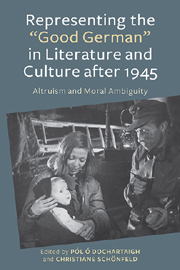Book contents
- Frontmatter
- Contents
- List of Illustrations
- Acknowledgments
- Introduction: Finding the “Good German”
- 1 Re-Presenting the Good German: Philosophical Reflections
- 2 “Görings glorreichste Günstlinge”: The Portrayal of Wilhelm Furtwängler and Gustaf Gründgens as Good Germans in the West German Media since 1945
- 3 From Hitler's Champion to German of the Century: On the Representation and Reinvention of Max Schmeling
- 4 Wilhelm Krützfeld and Other “Good” Constables in Police Station 16 in Hackescher Markt, Berlin
- 5 The “Good German” between Silence and Artistic Deconstruction of an Inhumane World: Johannes Bobrowski's “Mäusefest” and “Der Tänzer Malige”
- 6 Saints and Sinners: The Good German and Her Others in Heinrich Böll's Gruppenbild mit Dame
- 7 Being Human: Good Germans in Postwar German Film
- 8 “The Banality of Good”? Good Nazis in Contemporary German Film
- 9 Memories of Good and Evil in Sophie Scholl — Die letzten Tage
- 10 Deconstructing the “Good German” in French Best Sellers Published in the Aftermath of the Second World War
- 11 Macbeth, Not Henry V: Shakespearean Allegory in the Construction of Vercors's “Good German”
- 12 A Good Irish German: In Praise of Hugo Hamilton's Mother
- 13 Shades of Gray: The Beginnings of the Postwar Moral Compromise in Joseph Kanon's The Good German
- Works Cited
- Filmography
- Notes on the Contributors
- Index
11 - Macbeth, Not Henry V: Shakespearean Allegory in the Construction of Vercors's “Good German”
Published online by Cambridge University Press: 05 June 2013
- Frontmatter
- Contents
- List of Illustrations
- Acknowledgments
- Introduction: Finding the “Good German”
- 1 Re-Presenting the Good German: Philosophical Reflections
- 2 “Görings glorreichste Günstlinge”: The Portrayal of Wilhelm Furtwängler and Gustaf Gründgens as Good Germans in the West German Media since 1945
- 3 From Hitler's Champion to German of the Century: On the Representation and Reinvention of Max Schmeling
- 4 Wilhelm Krützfeld and Other “Good” Constables in Police Station 16 in Hackescher Markt, Berlin
- 5 The “Good German” between Silence and Artistic Deconstruction of an Inhumane World: Johannes Bobrowski's “Mäusefest” and “Der Tänzer Malige”
- 6 Saints and Sinners: The Good German and Her Others in Heinrich Böll's Gruppenbild mit Dame
- 7 Being Human: Good Germans in Postwar German Film
- 8 “The Banality of Good”? Good Nazis in Contemporary German Film
- 9 Memories of Good and Evil in Sophie Scholl — Die letzten Tage
- 10 Deconstructing the “Good German” in French Best Sellers Published in the Aftermath of the Second World War
- 11 Macbeth, Not Henry V: Shakespearean Allegory in the Construction of Vercors's “Good German”
- 12 A Good Irish German: In Praise of Hugo Hamilton's Mother
- 13 Shades of Gray: The Beginnings of the Postwar Moral Compromise in Joseph Kanon's The Good German
- Works Cited
- Filmography
- Notes on the Contributors
- Index
Summary
LeSilence de la mer (The silence of the sea), the Resistance novella by Jean Bruller (1902-91) — then writing under the pseudonym of Vercors — was published in occupied Paris by the clandestine publishing house Les Éditions de Minuit in 1942; it had been written between July and October, 1941. It is an ostensibly naturalistic story, one with a simple plot. It is the contention of this essay that the apparent naturalism of the prose is complicated by its investment in a clear Shakespearean allegory: the German believes he represents a “good” Shakespearean regime like that of Henry V but, clearly, he instead represents a dishonorable regime such as that of Macbeth. A Shakespeare-obsessed Nazi officer named von Ebrennac is billeted in a house that is owned by the unnamed first-person narrator, who continues to live there with his niece and the German. With restrained language the narrator recounts the German's wordy, seemingly well-intentioned, yet utterly naive efforts to prove that Germany is a friend to France, as well as his attempts to connect emotionally with the narrator's niece. Uncle and niece resist the German's advances using no tactic other than silence: disillusioned with the wall of silence he faces from his would-be friends and with the Nazi brutality that he finally begins to notice, von Ebrennac leaves France to go and voluntarily fight against the Soviets in the east — virtual suicide. Instinctively patriotic through a sort of passive resistance, the uncle and niece have thwarted what they perceive to be a cloyingly emotive wing of the Nazi invasion.
- Type
- Chapter
- Information
- Representing the "Good German" in Literature and Culture after 1945Altruism and Moral Ambiguity, pp. 184 - 196Publisher: Boydell & BrewerPrint publication year: 2013

